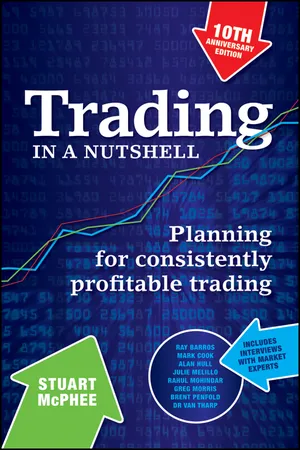Politics & International Relations
Stock Market
The stock market is a platform where shares of publicly traded companies are bought and sold. It serves as a barometer for the overall health of the economy and can be influenced by political events and international relations. Governments and policymakers often monitor stock market performance as an indicator of economic stability and investor confidence.
Written by Perlego with AI-assistance
Related key terms
2 Key excerpts on "Stock Market"
- Clea Bourne(Author)
- 2016(Publication Date)
- Routledge(Publisher)
5 Stock Market storytelling Dalliances with trust Chapter Five focuses on investment in Stock Markets, one of the most visible areas of finance. While bonds and derivatives trading make up the bulk of global capital market activity, traditional stock exchanges are still perceived as the most direct connection between capital markets and the ‘real’ economy, enabling ordinary citizens to own shares in familiar and exotic companies. Professional investors regard Stock Markets as a paradigm of the good society, and the best source of long-term investment returns (Aldridge 1997). Ordinary investors and professional investors are all motivated to ‘beat the market’ (McGoun et al. 2003). While Stock Markets are a declining portion of global capital, stock exchanges are on the rise – there are now hundreds around the globe. The largest, most active stock exchanges are located in international financial centres, including the two largest, London and New York; as well as centres such as Hong Kong, Tokyo, Chicago, Frankfurt, Paris, Toronto and Zurich, Sydney and Johannesburg. These financial centres have expanded rapidly in size, complexity and distribution channels as more companies turn to the capital markets for finance, issuing bonds and shares, and merging with or acquiring other companies. Unlike industry narratives promoted by trade associations in Chapter 4, Stock Market narratives have short lives and are constantly changing (Westbrook 2014). Rather than conjuring up notions of staid, trustworthy activity, Stock Markets are an incitement to adventure and exploration, a place of myths and legends, excitement, fashion and trends, even the ‘visual abundance of corruption’ (Stäheli 2008, p. 248). Such drama and excitement is achieved through storytelling. Capital markets are a discursive domain, where numbers – specifically price, value and capital – are bound together through storytelling and narrative (de Goede 2005, Westbrook 2014)- eBook - ePub
Trading in a Nutshell
Planning for Consistently Profitable Trading
- Stuart McPhee(Author)
- 2011(Publication Date)
- Wrightbooks(Publisher)
Chapter 2: Financial marketsIn a nutshell •There are numerous trading products available across many different financial markets. •Financial markets are a vital part of the world economy. •Stocks are the ideal starting point for traders.What are stock exchanges?Stock exchanges are financial markets that bring buyers and sellers of capital together in an efficient manner. They channel capital resources to those who will make the best use of them. Ultimately, resources that are used efficiently will benefit the whole community and not just the entity receiving the funds.In a layperson’s terms: if you had $10 000 to invest in a new company, you would experience some difficulty in establishing a new business and generating a profit within a certain period of time. However, with that same $10 000 you are able to invest in a well-established, already consistently profitable business and then benefit through capital gain and/or receiving your share of the profits.Having access to such an efficient process of capital resource allocation, we should ideally earn the best rate of return when investing in companies listed on a stock exchange. Unfortunately, this is not always the case. On all markets, there are many listed companies that make no money at all, despite their best efforts to do so, and thousands of people have lost all their money after investing in companies that are subsequently wound up.The importance of stock exchanges around the world to the various economies cannot be overstated. They are a vital part of the corporate world. The largest companies in the world that are well known by the majority of people are all listed companies on their respective stock exchanges.The most common financial product traded on stock exchanges is stocks or shares — these terms are commonly used interchangeably. Shares are equity securities, and represent the basic unit of ownership in a company. The total of all the shares in a company represents its equity capital. Equity capital is also often referred to as ‘risk capital’ as the owners have no guarantee of a return on their investment, or of recouping it. When you buy shares, you become a part-owner of the company and consequently share in its profits and losses.
Learn about this page
Index pages curate the most relevant extracts from our library of academic textbooks. They’ve been created using an in-house natural language model (NLM), each adding context and meaning to key research topics.

